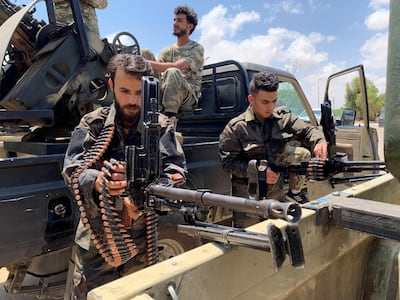Turkish President Recep Tayyip Erdogan is undermining a UN-brokered ceasefire, Libyan National Army spokesman Maj Gen Ahmed Al Mismari said on Saturday, a day after Libya's warring sides signed an agreement to stop fighting.
Mr Erdogan, who supports the Government of National Accord in Tripoli, said the deal reached in Geneva after UN-led talks “does not seem to be reliable”.
“The ceasefire agreement is not one at the highest level. Time will show how long it will persist at a lower level,” he told the state-run Anadolu news agency on Saturday.
Gen Al Mismari criticised Mr Erdogan’s pessimistic stance.
“The first oppositional statement came from Erdogan personally who made a statement undermining this agreement,” he said on Saturday.
Turkey has provided troops, weapons, trainers and thousands of Syrian mercenaries to the GNA, in a move widely condemned by the international community.
Despite the agreement to halt fighting, work to solve the dispute between the rival administrations, build a unified government and hold elections will be a long process.
Gen Al Mismari said the GNA’s, Prime Minister Fayez Al Sarraj, “does not represent the people of Libya”.
Last month, Mr Al Sarraj announced his intention to stand down “no later than October”.
Late on Saturday, the UAE welcomed the agreement for a permanent ceasefire and repeated the need for a “political solution” to the conflict.

“The UAE considers this decision an important step on the road to achieving a political settlement and the aspirations of the brotherly Libyan people to build a future that fulfils their aspirations for stability, peace and prosperity,” the UAE Ministry of Foreign Affairs and International Co-operation said.
The UN Support Mission in Libya called the ceasefire deal historic and praised both sides’ courage.
“I would like to salute you, because what you have accomplished here takes a great deal of courage”, acting special representative to Libya Stephanie Williams said.
The fighting has been raging since April 2019 when Field Marshal Khalifa Haftar, head of the eastern-based LNA, launched an offensive to capture Tripoli and end what he called the rule of militias.
The LNA and GNA had long been at loggerheads over delayed elections and on the roles and responsibilities of the branches of government.
With the help of Turkey, pro-GNA militias pushed back the LNA offensive to the central coastal town of Sirte when talks began to resolve the conflict politically.
